This report makes recommendations for how best to support parents of young families that are struggling in lockdown.
The study was conducted by Professor Jane Barlow and Dr Roosa Lambin at the University of Oxford’s Department of Social Policy and Intervention, who interviewed families and early years practitioners taking part in OCF’s Growing Minds project. This partnership project addresses the fact that disadvantaged children in Oxfordshire are five-and-a-half months behind their peers on starting school, increasing to nearly two years by age 16. The project helps children be more school ready by offering free books, one-to-one support and group learning sessions to families with children under five in Berinsfield and Littlemore.
The research looked at the impact of the COVID-19 pandemic on both the general wellbeing of the children and families, and on the delivery of the Growing Minds project, which had to adapt quickly to phone- and internet-based support in the face of lockdown restrictions. It finds that online delivery of group learning and activity sessions in particular presents a huge challenge to both practitioners and beneficiaries, with under-fives too young to take part, and vulnerable parents struggling with anxiety around the unfamiliar setting.
The report highlights the disparities between families depending on their economic resources, with disadvantaged families less able to work flexibly and less likely to have access to the necessary technological equipment and skills for participating in virtual groups. A new ‘risk group’ is identified that would not have needed extra support before the pandemic, and those with significant pre-existing multiple needs are highlighted as suffering the most from the withdrawal of professional and charitable services and support networks.
The concluding remarks include recommendations for how to adapt online provision in early years settings, and complement it with more personalised support for the most vulnerable families.
